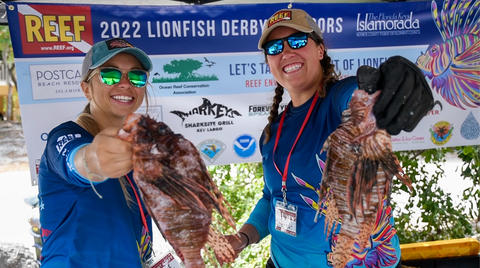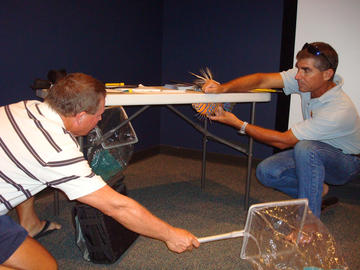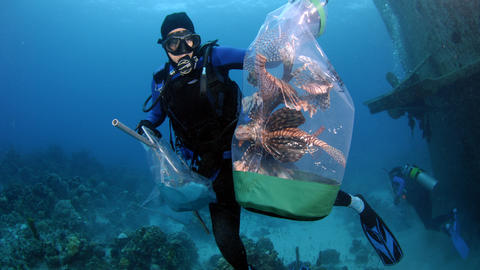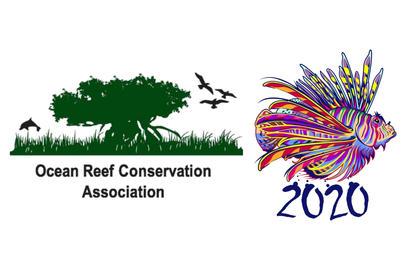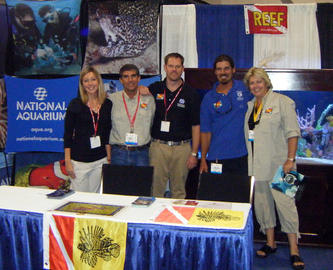Be sure to join us for the Florida Keys Lionfish Derby & Festival on Sept. 8-11, 2022! The event includes two days to collect as many invasive lionfish as possible, followed by a family-friendly lionfish festival hosted at the picturesque Postcard Inn Beach Resort & Marina in Islamorada. The festival is open to the public and features lionfish tastings, drink specials, educational demonstrations, games, interactive booths from environmental vendors, live music, and more.
Current search
Search found 714 items
- lionfish
The impacts of invasive lionfish (Pterois volitans/miles) on native coral reef populations in the Western Atlantic Ocean and Caribbean Sea can be enormous.
|
REEF is working in close partnership with the Florida Keys National Marine Sanctuary (FKNMS) to diligently track lionfish reports and initiate removal efforts in South Florida. The first confirmed lionfish in the Florida Keys was reported and captured within 24 hours in January 2009 (see previous enews article). Subsequent early reports in March-June were met with successful rapid response.
REEF is working in close partnership with the Florida Keys National Marine Sanctuary (FKNMS) to diligently track lionfish reports and initiate removal efforts in South Florida. The first confirmed lionfish in the Florida Keys was reported and captured within 24 hours in January 2009 (see previous enews article). Subsequent early reports in March-June were met with successful rapid response.
REEF is offering a series of free Lionfish Collection and Handling Workshops throughout south Florida and the Keys. Each workshop will include a classroom session covering the background of the invasion, lionfish biology, ecological impacts, current research, collecting and handling techniques, and other ways you can get involved. Attendees can obtain a permit to collect lionfish within the Sanctuary Preservation Areas (SPAs) in the Florida Keys National Marine Sanctuary using hand nets only.
REEF’s 2020 Upper Keys Lionfish Derby is sponsored by Ocean Reef Conservation Association (ORCA), a non-profit dedicated to protecting and preserving the environment, fish, wildlife, and marine related areas including water quality and habitat. Since 2009, ORCA has supported the efforts of several non-profits including Bonefish and Tarpon Trust, The Everglades Foundation, Audubon of Florida, Coral Restoration Foundation, Coastal Conservation Association and more. Education is an important part of ORCA's mission.
Earlier this month, the Dive Equipment and Marketing Association (DEMA) held its once a year industry-wide, international trade show in Las Vegas. As part of the show, which attracts over 10,000 industry professionals and businesses, DEMA recognized the importance of the recent lionfish invasion into the Atlantic and asked REEF to present four show-sponsored talks for attendees and members.
Coral Restoration Foundation (CRF) and Reef Environmental Education Foundation (REEF), are working together to raise awareness about coral reef conservation in the Florida Keys. For the first time ever, the marine conservation groups will host a special event, “Coral In and Lionfish Out,” to engage the public and raise funds for coral restoration and lionfish removal efforts in the Florida Keys.
The first confirmed lionfish sighting in the Florida Keys occurred on Tuesday, January 6, 2009. REEF received this specific sighting report at 2:30pm on the 6th from one of our volunteer divers from South Carolina, who was diving on vacation in the Keys. She found the fish near the base of Benwood Ledge (66') just offshore of the Benwood wreck, Key Largo. Via the numerous REEF media alerts and notices, she knew the invasion of lionfish was an issue and grabbed a few images with her digital camera to confirm the sighting.

